GLORIOUS THIRTIES
- 23 juil. 2017
- 7 min de lecture
The " Glorious Thirties" is a period ranging from 1947 to about 1975 in the history of France. Hardly any unemployement, economic progress and for me the end of the Algerian war and the construction of a gigantic circular road around Paris known as the "Boulevard Périphérique"
Coloured terra-cotta marbles and lead figurines of famous international cyclist champions have remained in the back of my mind and still do not want to be forgotten. The coloured marbles are those bought in Brittany, in the late fifties, in a small decrepit shop of a long forlorn village by the ocean. The lead figurines are those we played with when duplicating the day’s sportive achievements of Rudy Altig, Roger Rivière and other champions such as Bahamontès!

(We could play for hours...)
We would play in the sand of the courtyard, create a track supposed to be the day’s stage of the Tour de France. With a flick of a finger, the little marble would jump a few inches ahead and stop. We would then move the lead figurine where the marble had stopped and continue on for hours. It was enough to keep us busy and happy.
My playing mates had their pockets full of glass marbles with nice swirls of colours inside like small rainbows but these were of no interest to me. My heart was set on my coloured treasures and I would not have let go of them for anything.
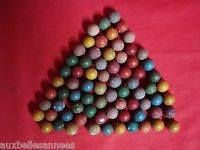
(Terra-cotta marbles: a treasure that one could buy only in Brittany...)
Close to the geographical limits of my small world, surrounded by a wooden palisade, was a vacant lot housing rabbits and turtledoves. Three quarter of an acre may be on which no one could keep weeds at bay and it was just fine until the Paris city council decided to build a low-rent housing in the midst of 1957. The rabbits and the turtledoves probably moved to some greener pastures and the ugly buildings soon accommodate fifty families. All around Paris, on the old line of the fortifications which had been taken down in 1919, an incredible amount of beggars, gypsies, thieves of all kind, petty criminals, had erected makeshift shantytowns. This “no-law” area will remain in the French argot as being “La Zone, usually describing any unorganized or run down area associated usually with suburbia!

( The first social housing building in Paris. The "fortifications" are still visible)
Building the « Boulevard Périphérique », Paris circular road, started in 1956. I Can steel see and smell dust flying in the air above the future “ring road” and I remember when the first section was inaugurated by General de Gaulle and his ministers on April 12 1960 between Porte de la PLaine and Porte d’Italie, just a stone’s throw from our apartment building. Rabbits and turtledoves had disappeared for good making space for concrete and steel. In this troubled period of an Algerian war soon to reach and end, there are rumours circulating: corpses of political opponents such as OAS (1) and FLN (2) alike have been drowned into the concrete used to build the huge six-lanes boulevard.
Will the Parisians be driving every day on a particularly painful and difficult part of the French colonial history?
In the early 60’s, Algeria was a part of France’s daily preoccupations. At 1PM, on the RTF daily news, one would see everyday pictures and short movie about terrorist attacks in Algiers against the French troops, and of course military operations conducted by the French forces against FLN Militants and other organisations supporting independence.
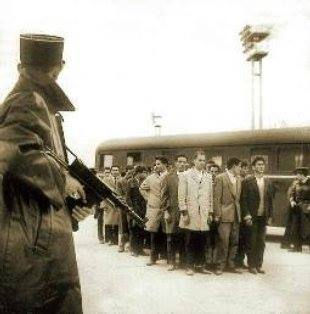
( Algeria's independence supporters arrested in Paris in during the Algerian war)
I even remember when one day, in May of 1961 my father took me by the Assemblée Nationale and showed me the tanks and loyalist military personnel which had been deployed to protect the centre of democratic life of France; the day before an attempted coup, engineered by fours rebellious French generals, had nearly overthrown the Vth republic !
Political organisations of all kinds, against or in favour of the Algerian independence would not hesitate to get money from whatever source when they were in need. On the Parisian subway system, on a daily basis, a special train collected the cash received during the day from the sale of tickets bought by passengers. Bags of coins and banknotes were swiftly loaded on the train and dropped at the end of the tour in a secluded place on the right bank, a special subway station close to the general public.
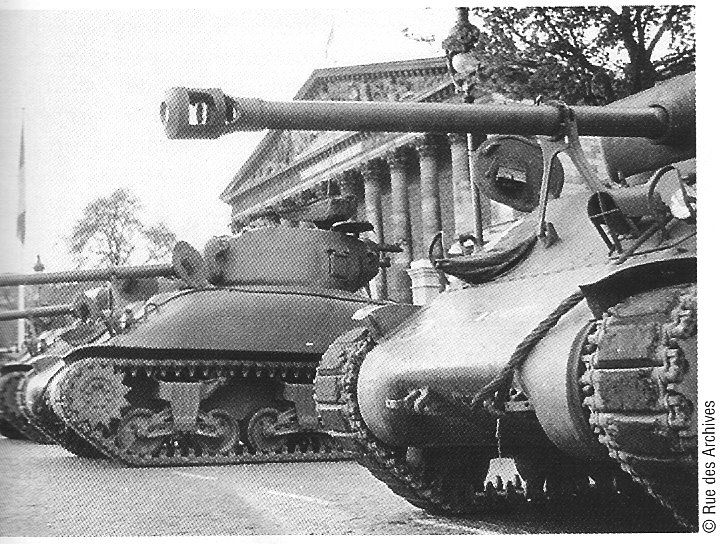
(French tanks protecting the Assemblée Nationale, during the Algiers putsch)
In order to protect the funds during collection, the military had arranged for ad-hoc protection and French soldiers would we riding on the top of the train, ready to engage with a heavy machine gun, would the hold-up take place in the tunnels or during the short stop in the stations!
Coming from America, based on a few significant movies such as “Rebel without a cause” or “The Wild one”, the equivalent subculture of “Greasers” called in French “Blousons Noirs” (black leather jackets) was invading France. Parents would warn their children and advise them not be associated with the “voyous”. In the early 60s, morale, prudishness and decency are still considered as the only real values in support of a post war society dealing with decolonisation and an incredible baby-boom. You will become a “blouson noir “would say my mother anytime she would see one of my report cards bearing so many negative comments from most of my teachers!
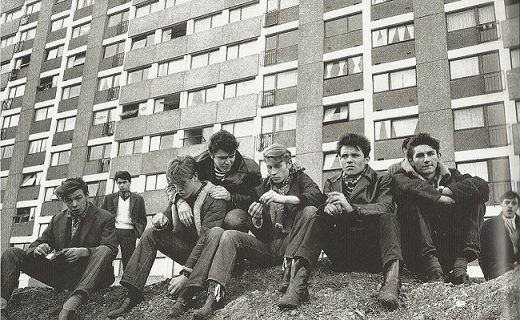
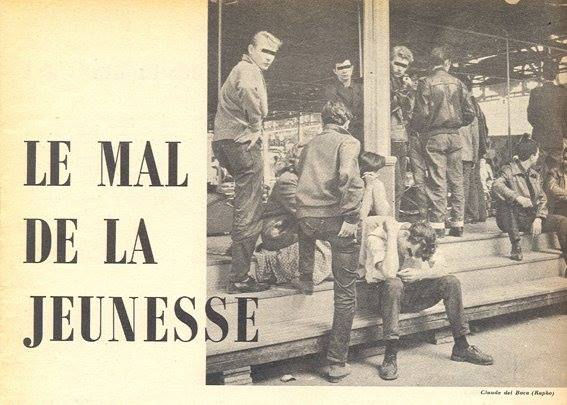
("Greasers, a trend coming from the US ...In French, we called them " blousons noirs", or "black jackets)
On March 18th 1962, France signs the Evian Accords ending the Algerian war and the 132 years of French presence in this part of North Africa. In three months, I will be eleven years old. I know nothing about Algeria even if I hear my parents and their friends analysing the situation every time they meet at home for dinner. My father is extremely concerned and fears that the Algerian situation is just the visible tip of a larger conspiracy originating in Moscow, under the control of a certain Nikita Sergueiovitch Krouchtchev a former associate of Joseph Stalin! The bourgeois society fears that France may be undermined by poverty, deprivation of human rights and political freedom, should the communist ever take power! It has become an obsession with many people and an additional reason to place confidence into the hands of conservative politicians!
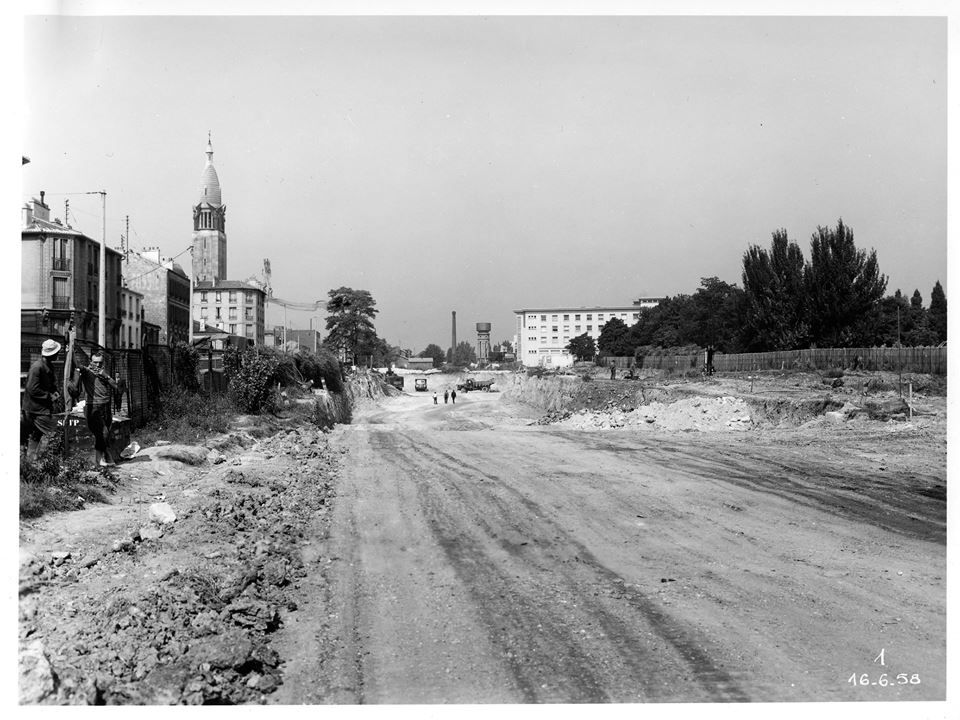
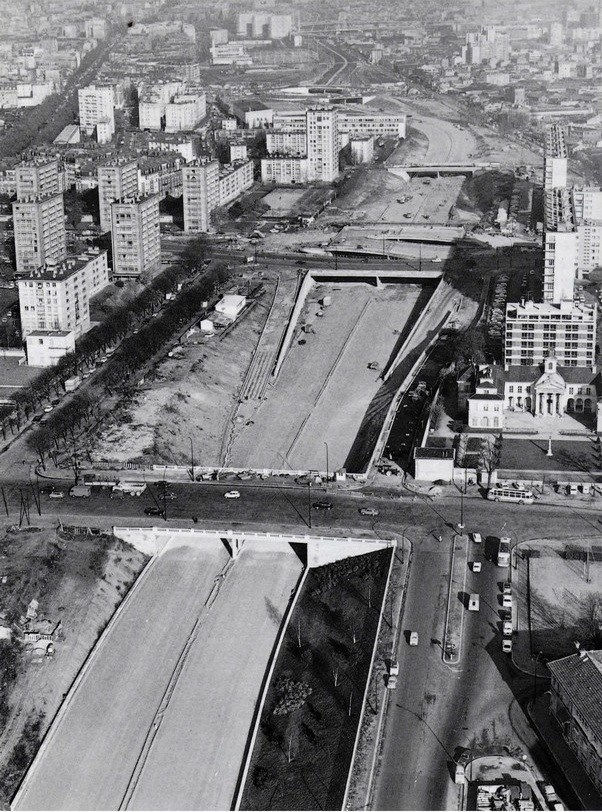
(Building the "périphérique", the infamous ring road around Paris)
Close to Porte d’Orléans, in the 14 th arrondissement (3), road works are going on and on. Old apartment buildings are being torn down to make place for larger ones in a growing real estate and speculative market. Every day, after a difficult awakening cause by long reading in bed (although forbidden by my parents) the previous evening, I find on the kitchen table, along with hot milk, a metal can of “ BANANIA”, a chocolate drink. On the box, the smiling face of a Senegalese Tirailleur (4), a remnant from the French colonial presence in West Africa, smile at me! I like this guy. I have of course no idea about the colonial History of the various European nations and luckily, I am totally un prejudiced! For me, Africa means lions, the colourful geography maps hanging on the wall in my classroom of Rue Prisse d’Avennes, Tintin in the Congo (5). I also keep in my treasure chest a few banknotes from west Africa showing black tribal warriors with a shield made of some animal skin!
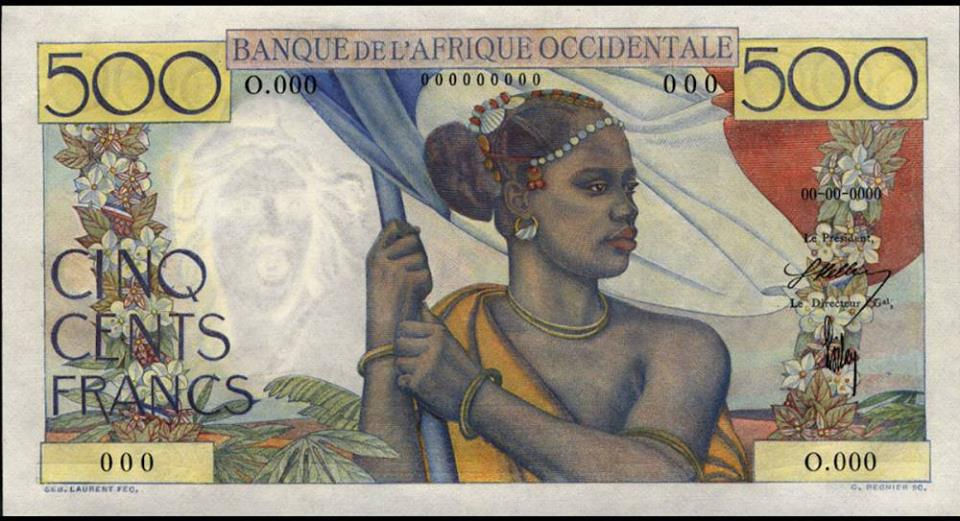
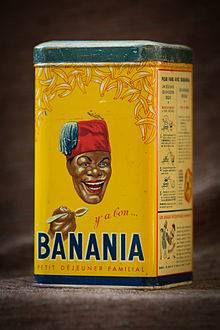
(An African banknote and a box of Banania, a chocolate breakfast in a metal box)
On rue Sarrette, not so far from the end of the street, there is an unusual shop with the name « Produits Coloniaux ». Getting inside, one can get overwhelmed by the smell of tea. There are no Chinese men working there, but single old man, Monsieur Laforgue, who open up metal jars containing over one hundred types of tea, so my mother, addicted to good manners and tea-time parties with her olds friends from the Egyptian era in the days of the Suez Canal Company, buys hundred grams of Lapsang-Souchong and eighty grams of Earl Grey flavoured with oil of Bergamot! Slightly over a year ago, the West African country known up to then as Dahomey, changed its name into Benin. IN a few months, lieutenant-colonel Bastien-Thiry and his OAS gang will set up an ambush against General De Gaulle’s motorcade in Le Petit-Clamart, a few miles away from Paris, in a punitive move against the decision by France to allow for Algeria’s independence.

(The liner " France", pride of the Compagnie Générale Transatlantique)
Two years ago, the French Liner “FRANCE” was launched by the Compagnie Générale Transatlantique (6) and christened by De Gaulle’s wife nicknamed Tante Yvonne by the people of France! On rue Alphonse Daudet, there is still plenty of space to park cars and the 2CV of my mother as well as the 15CV Traction (six cylinders) of my dad can easily be accessible close to the building where we live, just across from the Wine and Coal trade of Monsieur Chareire , an old folk from Auvergne living its exile in Paris like many of his cousins or family. Daniel Cohn-Bendit is only 17 and spends some time in England. Angelo Roncalli, the reformist, is still heading Roman catholic church as pope John XXIII while in Great Britain a bunch of four young men just signed a contract with a record company with a strange name: Parlophone (7)
The glorious thirties are rolling on, all is for the best in the best of all possible worlds and no one in France would ever think that just a few years ahead French society would implode.
©sylvain Ubersfeld 2017 pour Paris-Mémoire
(1) The OAS or Organisation de l’Armée Secrète was an extreme right wing group supported by a fraction of the armed forces whose ultimate goal was to keep Algeria as a part of the nation.
(2) FLN or Front National de Liberation was a militant political organisation aiming at making Algeria an independent nation.
(3) An administrative and geographic district of Paris. An arrondissement is usually home to several “quartiers” (e.g. Le Petit-Montrouge, Plaisance, Montparnasse…)
(4) Senegalese Tirailleurs were a part of the French armed including in World War I. Men from the French colonies were drafted to “do their duty for their mother country”
(5) A fictitious character created by Georges Remy, a Belgian comic artist. The Adventures of Tintin have been translated in more than 100 foreign languages. It often provided a " colonialistic" vision of the world fully in line when the period when these stories were written by Georges Remy also known by his pen name Hergé.
(6) Also, known as French Line
(7) Contract signed by The Beatles

Commentaires